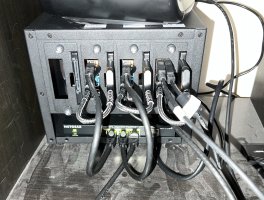My current inventory  For each one, I have one of these nifty little 7" LCDs that the Pi mounts directly to. I'm not a "Pi" guy, but occasionally I have clients that want a very fast prototype for something with a screen, and I use these (I have a buddy who does the GUI - I do the hardware/firmware design). You can see some green pcbs in the corner that these mounted onto.
For each one, I have one of these nifty little 7" LCDs that the Pi mounts directly to. I'm not a "Pi" guy, but occasionally I have clients that want a very fast prototype for something with a screen, and I use these (I have a buddy who does the GUI - I do the hardware/firmware design). You can see some green pcbs in the corner that these mounted onto.























































![Craft A Brew - Safale BE-256 Yeast - Fermentis - Belgian Ale Dry Yeast - For Belgian & Strong Ales - Ingredients for Home Brewing - Beer Making Supplies - [3 Pack]](https://m.media-amazon.com/images/I/51bcKEwQmWL._SL500_.jpg)





